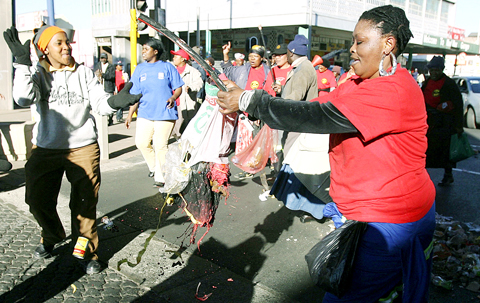South African council workers went into a second day of strikes for higher pay yesterday in the latest stand-off between President Jacob Zuma and labor unions that helped him to power in April.
Thousands of council workers boycotted work on Monday, demanding a 15 percent wage hike as the country grapples with its first economic recession since 1992, which the ruling African National Congress’ labor union allies say has hit hardest South Africa’s poor.
The South African Municipal Workers Union and Independent Municipal and Allied Trade Union, representing some 150,000 council workers, have rejected an 11.5 percent wage increase.

PHOTO: REUTERS
Striking workers marched through the streets of Johannesburg’s city center on Monday, overturning garbage bins, chanting revolutionary songs and vowing not to return to their jobs until their demands are met.
Protest marches also took place in other main cities and police fired rubber bullets in some instances to disperse unruly union members.
South Africa’s financial markets have not yet suffered from the strike, but analysts say prolonged action could start to weigh.
“Such an event would cause investors to become more aware of political risk,” said Alvise Marino, emerging market analyst at IDEAglobal.
Investors are also keenly watching the stand-off, which could add pressure on Zuma to meet unions demands for more social spending.
Zuma said last week it is not unusual for workers to strike this time of the year when wage talks are taking place but called for a speedy conclusion to negotiations.
In a statement issued late on Monday, the local government running Johannesburg — the country’s biggest city — said rubbish collection, bus, water, parks and revenue services had all been disrupted. But emergency services were operating at full capacity despite the strike.
It said some of its 87 health clinics had also experienced problems.
A man who identified himself as Gabriel told radio station Talk Radio 702 how he had not been able to bury his two-month-old daughter because the cemetery was closed by the labour action.
The strike by public transport workers, refuse collectors and licensing officers among others, follows days of violent protests by residents of impoverished townships who have complained about lack of healthcare, water and electricity.
Workers in the chemical sector have also been on strike for higher pay and unions in the gold and coal sectors was to announce yesterday whether to accept an improved wage offer.
Stoppages would impact some of the world’s biggest mines.

Kehinde Sanni spends his days smoothing out dents and repainting scratched bumpers in a modest autobody shop in Lagos. He has never left Nigeria, yet he speaks glowingly of Burkina Faso military leader Ibrahim Traore. “Nigeria needs someone like Ibrahim Traore of Burkina Faso. He is doing well for his country,” Sanni said. His admiration is shaped by a steady stream of viral videos, memes and social media posts — many misleading or outright false — portraying Traore as a fearless reformer who defied Western powers and reclaimed his country’s dignity. The Burkinabe strongman swept into power following a coup in September 2022

‘FRAGMENTING’: British politics have for a long time been dominated by the Labor Party and the Tories, but polls suggest that Reform now poses a significant challenge Hard-right upstarts Reform UK snatched a parliamentary seat from British Prime Minister Keir Starmer’s Labor Party yesterday in local elections that dealt a blow to the UK’s two establishment parties. Reform, led by anti-immigrant firebrand Nigel Farage, won the by-election in Runcorn and Helsby in northwest England by just six votes, as it picked up gains in other localities, including one mayoralty. The group’s strong showing continues momentum it built up at last year’s general election and appears to confirm a trend that the UK is entering an era of multi-party politics. “For the movement, for the party it’s a very, very big

ENTERTAINMENT: Rio officials have a history of organizing massive concerts on Copacabana Beach, with Madonna’s show drawing about 1.6 million fans last year Lady Gaga on Saturday night gave a free concert in front of 2 million fans who poured onto Copacabana Beach in Rio de Janeiro for the biggest show of her career. “Tonight, we’re making history... Thank you for making history with me,” Lady Gaga told a screaming crowd. The Mother Monster, as she is known, started the show at about 10:10pm local time with her 2011 song Bloody Mary. Cries of joy rose from the tightly packed fans who sang and danced shoulder-to-shoulder on the vast stretch of sand. Concert organizers said 2.1 million people attended the show. Lady Gaga

SUPPORT: The Australian prime minister promised to back Kyiv against Russia’s invasion, saying: ‘That’s my government’s position. It was yesterday. It still is’ Left-leaning Australian Prime Minister Anthony Albanese yesterday basked in his landslide election win, promising a “disciplined, orderly” government to confront cost-of-living pain and tariff turmoil. People clapped as the 62-year-old and his fiancee, Jodie Haydon, who visited his old inner Sydney haunt, Cafe Italia, surrounded by a crowd of jostling photographers and journalists. Albanese’s Labor Party is on course to win at least 83 seats in the 150-member parliament, partial results showed. Opposition leader Peter Dutton’s conservative Liberal-National coalition had just 38 seats, and other parties 12. Another 17 seats were still in doubt. “We will be a disciplined, orderly